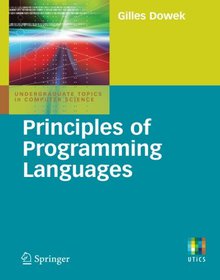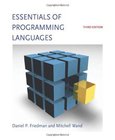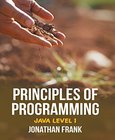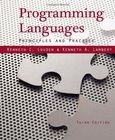Principles of Programming Languages

Book Details:
| Publisher: | Springer |
| Series: | Springer , Principles |
| Author: | Gilles Dowek |
| Edition: | 1 |
| ISBN-10: | 1848820313 |
| ISBN-13: | 9781848820319 |
| Pages: | 159 |
| Published: | Mar 13 2009 |
| Posted: | Nov 19 2014 |
| Language: | English |
| Book format: | |
| Book size: | 2.02 MB |
Book Description:
Weve known about algorithms for millennia, but weve only been writing c- puter programs for a few decades. A big di?erence between the Euclidean or Eratosthenes age and ours is that since the middle of the twentieth century, we express the algorithms we conceive using formal languages: programming languages. Computer scientists are not the only ones who use formal languages. - tometrists, for example, prescribe eyeglasses using very technical expressions, ? ? such as OD: -1.25 (-0.50) 180 OS: -1.00 (-0.25) 180 , in which the parent- ses are essential. Many such formal languages have been created throughout history: musical notation, algebraic notation, etc. In particular, such languages have long been used to control machines, such as looms and cathedral chimes. However, until the appearance of programming languages, those languages were only of limited importance: they were restricted to specialised ?elds with only a few specialists and written texts of those languages remained relatively scarce. This situation has changed with the appearance of programming l- guages, which have a wider range of applications than the prescription of e- glassesorthecontrolofaloom,areusedbylargecommunities,andhaveallowed the creation of programs of many hundreds of thousands of lines.
Download Link:
Related Books:
Essentials of Programming Languages
3rd Edition
This book provides students with a deep, working understanding of the essential concepts of programming languages. Most of these essentials relate to the semantics, or meaning, of program elements, and the text uses interpreters (short programs that directly analyze an abstract representation of the program text) to express the semantics of many essential language elements in a way that is both clear and executable. The approach is both analytical and hands-on. The book provides views of programming languages using widely varying levels of abstraction, maintaining a clear connection between the high-level and low-level views. Exercises are a vital part...
Principles of Programming
Java Level 1
Principles of Programming: Java Level 1 is a minimalist computer science textbook, designed for a short, intensive, beginner-level coding course. Unlike other textbooks, this book does not attempt to cover all of Java. The book starts you off with "Hello World," gradually adding new concepts, in order of increasing complexity. Topics covered include screen output, information storage and processing, user input, Boolean logic and decision making, and looping. After learning all the concepts, you get to build a simple game. Finally, the book features a guide to getting help and the definitions of its few technical terms....
Programming Languages
Principles and Practices
3rd Edition
Kenneth Louden and Kenneth Lambert's new edition of PROGRAMMING LANGUAGES: PRINCIPLES AND PRACTICE, 3E gives advanced undergraduate students an overview of programming languages through general principles combined with details about many modern languages. Major languages used in this edition include C, C++, Smalltalk, Java, Ada, ML, Haskell, Scheme, and Prolog; many other languages are discussed more briefly. The text also contains extensive coverage of implementation issues, the theoretical foundations of programming languages, and a large number of exercises, making it the perfect bridge to compiler courses and to the theoretical study of programming...
2007 - 2021 © eBooks-IT.org



